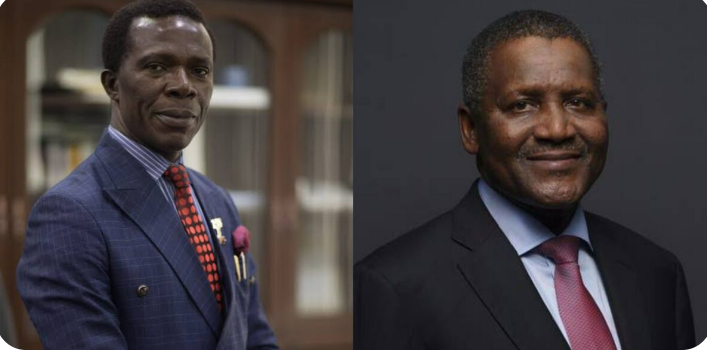
Nigeria’s Richest Man, Africa’s Top Debtor: Cosmos Maduka Drops a Bombshell on Aliko Dangote

In a bold and startling statement that has reverberated across Nigeria’s financial and business circles, renowned businessman and founder of Coscharis Group, Dr. Cosmos Maduka, declared Aliko Dangote — Africa’s wealthiest man — as the number one debtor in Nigeria. The assertion, made during a recent interview, has sparked intense public debate, drawing both criticism and reflection from Nigerians on the true nature of wealth, credit, and success.
Maduka, known for his unfiltered perspectives and vast business experience, highlighted the paradox that the most indebted individuals or institutions are often perceived as the richest. In his words, "The number one debtor in Nigeria is Aliko Dangote. He’s the wealthiest man in Africa. The number one debtor in the world is the United States of America, and you call them the richest in the world." This jarring comparison struck a chord with many, especially given Nigeria’s complex relationship with credit, debt, and economic perception.
To Maduka, the secret isn’t just in taking loans — it’s in how you manage them. He emphasized that leveraging credit is essential for growth, but warned against overreaching. "You should leverage on loan," he advised, "but you have to have a good structure that will support that loan." He further recommended that individuals should not borrow beyond 20% of their income, a financial discipline he believes is key to sustainable success.
The statement has done more than stir reactions; it has forced many Nigerians to reconsider the traditional notions of debt. While debt is typically viewed negatively — often associated with poverty, desperation, or poor financial management — Maduka paints a different picture: one where strategic borrowing and intelligent risk-taking can be tools for building immense wealth. And in Aliko Dangote’s case, this strategy has seemingly paid off.
Dangote, founder of the Dangote Group, has long been celebrated for building an industrial empire that spans cement, sugar, flour, and most recently, oil refining with the launch of the massive Dangote Refinery. It’s no secret that such ventures require astronomical capital outlay, often funded by large loans. But the idea that the billionaire is Nigeria’s leading debtor came as a shock to many who equate debt with struggle rather than strategy.
Online, Nigerians didn’t hold back their reactions. One user, @ifegadimma, shared a rather skeptical take: “Go to market and see how people proudly boast about the large loans they’ve taken from the bank to start their businesses. They stress themselves out trying to make sales to repay those loans, and their claims about being successful entrepreneurs seem like a complete joke to me.” This comment reflects a broader societal tension — the pressure to achieve financial success, even at unsustainable costs.
Another user, @THE_CRAFT3R, added a more humorous but biting remark: “Imagine going to the bank to take a loan of N1,000. This is the wildest thing I’ve heard this year.” The sentiment captures the despair many feel about Nigeria’s deteriorating economy, where access to meaningful credit remains elusive to the average citizen, and yet borrowing remains a necessity for survival.
Still, there are those who resonate with Maduka’s message. @_Ekezie commented, “Only people who build real wealth like this can write a book and host or speak in seminars. The rest are either motivational speakers or political looters who can’t defend their wealth.” For some, Maduka’s statement is a clarion call for transparency and a reevaluation of what constitutes true financial acumen.
Beyond the controversy, what Dr. Maduka has managed to do is spotlight a critical, often misunderstood component of wealth creation: debt. In Nigeria, where economic challenges run deep and the cost of living continues to rise, the word "debt" often conjures fear rather than opportunity. Yet globally, some of the most successful corporations and nations operate on borrowed money. The difference lies in how they manage, utilize, and structure that debt.
The United States, as Maduka pointed out, is the world's largest debtor — yet it remains the largest economy. It runs on a system of credit that is deeply embedded into every facet of its economic engine, from consumer spending to industrial expansion. Likewise, successful entrepreneurs across the globe understand that capital — whether earned or borrowed — must be deployed smartly to generate returns. It's this principle that seems to underlie Dangote's financial model, and which Maduka urges others to emulate — with caution.
This conversation also brings to the fore the need for more robust financial literacy in Nigeria. Many Nigerians, especially young entrepreneurs, fall into the debt trap without fully understanding how to use loans as leverage rather than lifelines. With the economic environment as volatile as it is, the difference between smart borrowing and financial disaster can come down to a few percentage points — or a weak repayment plan.
As the dust settles on Maduka’s viral revelation, one thing is clear: the lines between debt and wealth, poverty and prosperity, have never been more blurred — or more important to understand. For every Nigerian dreaming of success, his message serves as both a wake-up call and a blueprint. You can build empires on borrowed money — but only if you build wisely.
Aliko Dangote may be the top debtor in Nigeria, but he is also the nation's foremost industrialist, employing thousands and driving massive economic impact. In this equation, debt is not a weakness — it is the engine. And for those paying attention, it may well be the biggest secret behind the wealth they aspire to.


